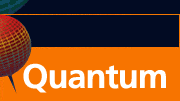CONTACTS
 |


Quantum Initiative: Quantum Lunch
The Quantum Lunch is regularly held on Thursdays in the Theoretical Division Conference Room, TA-3, Building 123, Room 121.
The organizing committee includes Malcolm Boshier (P-21), Lukasz Cincio (T-4), Diego Dalvit (T-4), Changhyun Ryu (P-21) , Nikolai Sinitsyn (T-4), Rolando Somma (T-4), Yigit Subasi (T-4), Christopher Ticknor (T-1), and Wojciech Zurek (T-4).
For more information, or to nominate a speaker, contact Yigit Subasi or Lukasz Cincio.
To add your name to the Quantum Lunch email list, contact Amanda Martinez.
Thursday, November 15, 2018
12:30 PM - 2:00 PM
Speaker: Adan Cabello (University of Seville)
Technical Host: Lukasz Cincio
TOPIC: The physical origin of quantum nonlocality and contextuality
Abstract
What is the physical principle that singles out the quantum correlations for Bell and contextuality scenarios? Here we show that, if we restrict our attention to correlations that, as is the case for all correlations in classical and quantum physics, can be produced by measurements that: (i) yield the same outcome when repeated, (ii) only disturb measurements that are not jointly measurable, and (iii) all their coarse-grainings have realizations that satisfy (i) and (ii), then the question has a surprising answer. The set of quantum correlations is singled out by the following principle: No law restricts the outcomes of the measurements; every outcome probability distribution that is not inconsistent does take place. "Not inconsistent" distributions are defined through a necessary condition based on the observation that, for measurements satisfying (i)-(iii), the sum of the probabilities of any set of pairwise exclusive events is bounded by one. Two events are exclusive if they correspond to different outcomes of the same measurement. To prove the result, we begin by characterizing the sets of not inconsistent probability distribution for each "graph of exclusivity", without referring to any particular scenario, but treating all Bell and contextuality scenarios at once. The restrictions of each scenario are introduced at the end of the proof and then we obtain the set of probability distributions that satisfies the above principle for each scenario. Each of these sets is equal to the corresponding set in quantum theory.
Reference: arXiv:1801.06347v2. |


